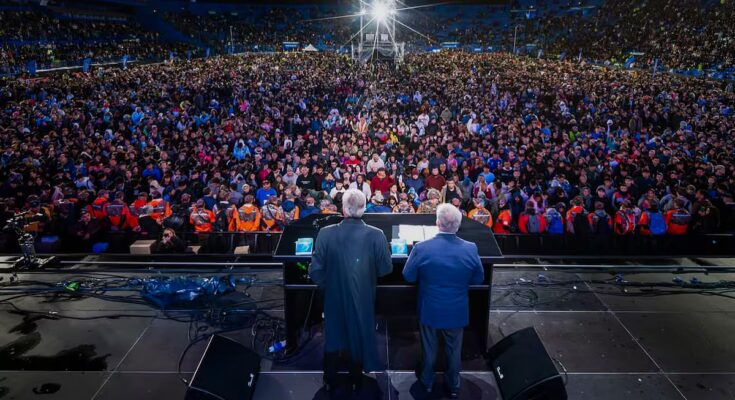who could
live between the two.
First I will love the world
and then I will love God
The breath of spirituality of the new album by the Spanish Rosalía crossed borders and oceans this Friday, the day of its debut. His song of love for the divine and the evocation of saints and religious images by the same artist who three years earlier experimented with Latin rhythms and lyrics about sex and fame has reached the ears of fans, but also of those who foresee the return of a global conservative current. That same Friday, in Buenos Aires, 10,500 kilometers from Barcelona, more than 30,000 evangelicals gathered in a football stadium in the Argentine capital to listen to the words of the American preacher Franklin Graham, Donald Trump’s favorite. An even larger number attended this Saturday.
Graham is the heir to the powerful evangelical dynasty founded by his father, Billy Graham. Like him, he remains close to power and is also the protagonist of a “Christian awakening” world tour carried out in dozens of countries. The Festival of Hope repeats its format every time. It starts with evangelical musical performances that go growing to the main course: the preaching of the pastor and his subsequent absolution of sins.
“People are searching. People are searching for purpose, for meaning in their lives. But something is missing. There is a void within us that can only be filled by God. And I tell you: God has a plan for your life,” Graham proclaimed from the raised pulpit above the Vélez Sarsfield Stadium stage. “But we have a problem. And the problem is sin. Sin keeps God from revealing himself and showing you his plan. Sin is a barrier between you and God,” he continued to an auditorium full of teenagers and families with children.
Among the long list of sins cited by Graham, homosexuality – “God wants you to use sex, but it must be used within a marital relationship between a man and a woman. Not between two men. Not between two women” – and abortion – “abortion in the eyes of God is murder” stood out.
His reactionary speech clashes with current laws in Argentina, but also shows the ongoing cultural battle, defended by the far-right government of Javier Milei and which is finding a growing echo in Argentina.
Graham’s sermon was interrupted several times by applause. The loudest was the one he received mentioning the meeting he had with Milei last Tuesday. The American pastor told the festival that Milei told him about Moses, the Old Testament prophet with whom he loves to identify, and that he gave him a Bible, the same gift that the participants received at the end of the event.
President Javier Milei received evangelical preacher Franklin Graham, current president and executive director of the Billy Graham Evangelistic Association (BGEA) and the evangelical organization Samaritan’s Purse, at Casa Rosada.
Furthermore, he was accompanied by the member of… pic.twitter.com/D878Wm8rr0
— Office of the President (@OPRAgentina) November 4, 2025
The day before, October 31, the Argentine president had received the representatives of the Alliance of Evangelical Churches of the Argentine Republic (Aciera) at the Casa Rosada. The meeting was followed by an unprecedented act of prayer. Never before had an evangelical ceremony been held in the headquarters of the Argentine Executive. Neither had a president of this Latin American country declared that God had appeared to him to reveal a mission, nor had he exhorted “the forces of heaven” to emerge victorious from the transformation that he promoted in Argentina with a blow of a chainsaw.
About 15% of Argentines identify as evangelical, a figure lower than the Latin American average, which is around 20%. Despite this, both the number of believers in this cult and the power of its leaders are increasing, although far from what they have had for decades in countries such as the United States and Brazil. “Until now there was a territorial evangelical presence that could not make the leap into politics,” says sociologist Ariel Goldstein, author of the book evangelical power.
The Argentine president began courting the Christian vote during his 2023 campaign as a strategy to reach popular sectors, but this year he has multiplied his gestures towards them. In the October 26 legislative elections, six evangelical candidates were elected by Milei’s party, La Libertad Avanza, which will take office in December. Among these stands out Pastor Nadia Márquez, future senator, who claims that abortion “is one of the greatest genocides in history” and promotes the repeal of the law on voluntary termination of pregnancy approved in Argentina five years ago.
For Goldstein, the main capacity of evangelization is “its ability to build in emotional terms and belonging and in Argentina it advances in a context of social disintegration which has accelerated after the pandemic”. This sociologist warns that not all evangelical churches advocate far-right positions like Graham’s. In 2023 some of them supported the Peronist candidate Sergio Massa.
Despite this, he believes that many Pentecostal pastors have become intermediaries between the Argentine right and the popular classes. “The Milei government is suffering wear and tear, even though it has managed to retain an important part of the votes. One way to expand its social base to the popular and middle sectors is through evangelization,” says Goldstein. Their example is Trump and former Brazilian president Jair Bolsonaro. The enormous applause of Argentine evangelicals at Milei’s name demonstrates the success of this strategy.



